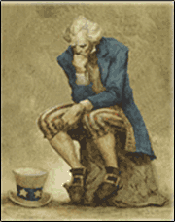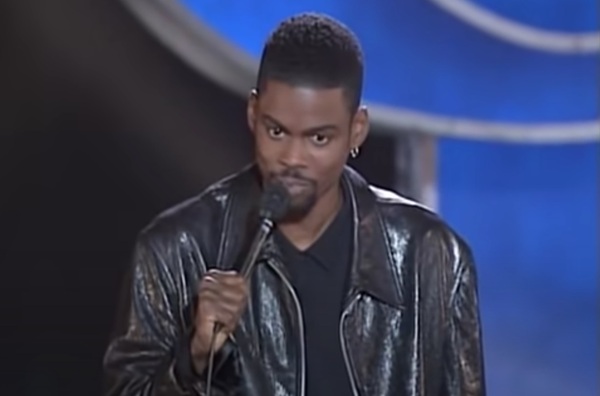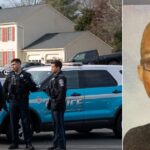
–>
June 14, 2023
In 1996 comedian Chris Rock performed an HBO special called, “Bring the Pain” (full video here). His most memorable routine began with: “Who’s more racist? Black people or white people? Black people. Because everything white people hate about black people, black people REALLY don’t like about black people.” Rock used the hard, “R”, calling it a Civil War between black people and n****** , declaring that, “n****** got to go!”
‘); googletag.cmd.push(function () { googletag.display(‘div-gpt-ad-1609268089992-0’); }); document.write(”); googletag.cmd.push(function() { googletag.pubads().addEventListener(‘slotRenderEnded’, function(event) { if (event.slot.getSlotElementId() == “div-hre-Americanthinker—New-3028”) { googletag.display(“div-hre-Americanthinker—New-3028”); } }); }); }
The audience in Washington DC was mostly if not entirely black, and the laughter was loud. It was real. And it signaled agreement.

YouTube screengrab
Highlights: “I love black people but I hate n******!” He ripped into them for their low expectations, shunning education, “loving to not know” and wanting, “credit for things they’re supposed to do like taking care of their kids…and never going to jail.”
Criticizing the injustice of welfare: the black father with 2 jobs and the “n***** who can’t find one?” The black mother working hard for 2 kids vs the welfare mother of 9…” Playing devil’s advocate he mimics, “Why do you have to say that? It’s the media…” But Rock immediately shuts that lame argument down. “When I go to the cash station at night, I ain’t looking over my shoulder for the media. I’m looking for n******! Ted Koppel ain’t never took sh*t from me. But n****** have: Rock was “tired, tired, tired of this…” The audience agreed.
‘); googletag.cmd.push(function () { googletag.display(‘div-gpt-ad-1609270365559-0’); }); document.write(”); googletag.cmd.push(function() { googletag.pubads().addEventListener(‘slotRenderEnded’, function(event) { if (event.slot.getSlotElementId() == “div-hre-Americanthinker—New-3035”) { googletag.display(“div-hre-Americanthinker—New-3035”); } }); }); }
Entertainment Weekly called it, “groundbreaking” and “classic”. Variety compared Rock to revered comedians Richard Pryor and Lenny Bruce and called it “one of the truly remarkable hours of comedy ever to air on television.” Why? Because both blacks and whites saw an authentic black voice articulating uncomfortable truths through comedy about black anti-social and self-defeating behavior. And he said it needed to stop. Rock would win 2 Emmys for this special the following year.
Just 8 years later, on May 17, 2004, 3000 of the nation’s black elite were also in Washington DC, but this time in Constitution Hall to celebrate the 50th anniversary of the U.S. Supreme Court’s decision in Brown v Board of Education of Topeka. This landmark decision effectively ended racial segregation in schools and is largely responsible for the Civil rights movement that followed. This was a night to celebrate and remember all those who opened doors.
Or was it? Because when featured speaker Bill Cosby took to the podium, he laid into the same black ghetto culture that Rock did 8 years earlier and sucked all the air out of the room. He called out the 50% dropout rate, high prison rates, the 70% of black mothers unwed at the time. Fathers running away from responsibility. He blasted black English/grammar:
“Everybody knows it’s important to speak English except these knuckleheads. You can’t land a plane with, ‘Why you ain’t…’ You can’t be a doctor with that kind of crap coming out of your mouth. There is no Bible that has that kind of language… these people are fighting hard to be ignorant.”
He tore into parents and black churches for allowing all this to go on for 50 years unabated. While echoing earlier praise for those in the movement who marched, who got punched in the face, had rocks thrown at them so that black kids could get an education, he then wondered what it was all for. “What the hell good is Brown v BOE if nobody wants it?”
Like Rock, Cosby received praise for speaking the truth and criticism for airing their dirty laundry in public. But just three weeks later he appeared at Jesse Jackson’s Rainbow/PUSH and said,
‘); googletag.cmd.push(function () { googletag.display(‘div-gpt-ad-1609268078422-0’); }); document.write(”); googletag.cmd.push(function() { googletag.pubads().addEventListener(‘slotRenderEnded’, function(event) { if (event.slot.getSlotElementId() == “div-hre-Americanthinker—New-3027”) { googletag.display(“div-hre-Americanthinker—New-3027”); } }); }); } if (publir_show_ads) { document.write(“
“Let me tell you something. Your dirty laundry gets out of school at two-thirty everyday. It’s cursing and calling each other nigger as they walk up and down the street. They think they’re hip. They can’t read. They can’t write. They’re laughing and giggling and they’re going nowhere.”
Cosby would continue this blunt truth-telling at college campuses and churches.
Democrat Juan Williams of Fox News was so impressed that he took note of Cosby’s speaking tour and wrote a book about it in 2006 called, Enough: The Phony Leaders, Dead-End Movements, and Culture of Failure That Are Undermining Black America—and What We Can Do About It. Williams’s book is a treatise on the state of Black America in 2004 that echoes Rock’s comedy routine and Cosby’s blistering speech and reads mostly like a conservative take on solutions.
“Phony leaders” who, in Cosby’s words, don’t want to fix the problems facing poor blacks but rather get rich fundraising off their backs. Too many “race hustlers” and “poverty pimps” focused on “dead-end movements” like Reparations rather than leading and encouraging the “self-determination” ethos of Booker T. Washington.
A school choice advocate, Williams routinely chastised the widely accepted culture of black kids bullying the few black kids who take education seriously and speak English correctly as, “acting white”.
He offered the same simple solutions known forever and repeated from Sowell to Obama: finish high school, don’t have a child until after 21, get married, learn to speak English correctly, value and prioritize education.
Williams would also echo Cosby’s harsh criticism of rap/hip hop, calling it a modern day “minstrel show”, and lambasting the so-called black leaders would do nothing about it. These demeaning images of black people spilled out over BET for the world to see. This? After all the struggles and victories gained by real civil rights warriors like, Oseola McCarty, Denmark Vesey, Nat Turner, Harriet Tubman, Booker T. Washington, Frederick Douglas, MLK and countless others? No. It must stop.
The sexual assault allegations against Cosby were always there, under the surface, but he remained un-charged as long as he was still useful to the black community. But to a newer crop of race hustlers (Ta-Nehisi Coates, Michael Eric Dyson) he wasn’t. And so began their assault on Cosby’s remarks, his character, his age and they dismissed him as just another cranky old man. He was cancelled and eventually charged and convicted of drugging women and having unwanted sex with them. He went on to serve time, but his conviction was later overturned.
In 1996 Chris Rock declared the self-destructive and anti social behavior of black ghetto culture “has got to go.” In 2004 Bill Cosby issued a clarion call to 3000 blacks who have “misled, mismanaged and mishandled” blacks for the past 50 years. In 2006 Juan Williams declared: “Enough!” in his book. And in 2008 America elected an articulate black president to two terms who repeated many of these truths.
The causes of perpetual black failure and dysfunction are well documented and the solutions are crystal clear. Yet black audiences still choose the “minstrel show” that makes fun of them. Those 3000 elite black leaders still choose fundraising off that minstrel show rather than fixing it. Juan Williams chose to make millions as the leftist shill on The Five, defending Democrat policies that hurt blacks and attacking Republican policies, many of which he defended in his book.
And Obama? He chooses not to live anywhere near blacks whose “lives (don’t) matter.” It’s 2023 and black America’s dominant elites, especially in the media, have chosen to do nothing.
Enough?
<!–
–>
<!– if(page_width_onload <= 479) { document.write("
“); googletag.cmd.push(function() { googletag.display(‘div-gpt-ad-1345489840937-4’); }); } –> If you experience technical problems, please write to [email protected]
FOLLOW US ON
<!–
–>
<!– _qoptions={ qacct:”p-9bKF-NgTuSFM6″ }; ![]() –> <!—-> <!– var addthis_share = { email_template: “new_template” } –>
–> <!—-> <!– var addthis_share = { email_template: “new_template” } –>




